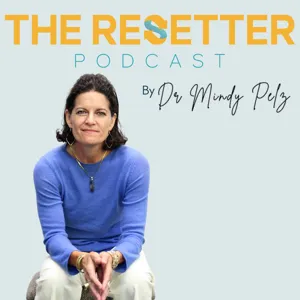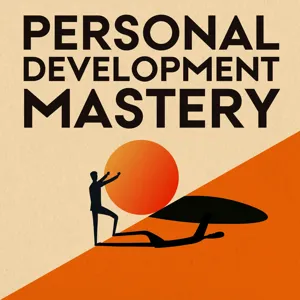Podcast Summary
Discovering the Benefits of Meditation for Menopause with Ariel Garten: Meditation, aided by Muse, can improve focus, happiness, and sleep during menopause by training the brain to reduce stress and anxiety, enhancing neurochemical benefits.
Meditation, which can be challenging for those with active minds, is a valuable tool for improving focus, happiness, and sleep during menopause. Ariel Garten, the co-founder of Muse, a headband that trains the brain to meditate, joins the podcast to discuss the neurochemical benefits of meditation for the menopausal brain. With a background in neuroscience and psychotherapy, Garten provides insights into why meditation is effective and how to use Muse to enhance the practice. Whether or not you choose to use Muse, this discussion offers a fresh perspective on meditation and its role in supporting women through the neurochemical changes of menopause. For those interested, Muse is offering a discount and a free year of their premium app to listeners. Additionally, Mindy invites listeners to join her Reset Academy for support and guidance in implementing a fasting lifestyle for optimal health.
Meditation for Menopausal Women: Improve Sleep and Emotional Regulation: Meditation can help restore neuroplasticity, regulate neurochemistry, and support the production of neurotransmitters during menopause, leading to better sleep and emotional regulation.
Meditation is a powerful tool for the menopausal brain, particularly for women over 40 who may be struggling with sleep and emotional regulation. Meditation helps improve both by regulating neurochemistry and promoting neuroplasticity. During menopause, the hypothalamus, responsible for various bodily functions, can become dysregulated, leading to symptoms such as sleep disturbances and lack of focus. As we lose hormones like estradiol and progesterone, we also lose neurotransmitters like dopamine, serotonin, and GABA. Meditation can help restore neuroplasticity and support the production of these neurotransmitters, leading to better emotional regulation and improved focus and cognition. By making meditation a part of our daily routine, we can unlock our fullest potential during menopause and beyond. To learn more and join a supportive community, visit doctormindypels.com/resetacademy.
Meditation strengthens the prefrontal cortex: Meditation enhances attention and focus, decreases anxiety, and strengthens the relationship between the prefrontal cortex and amygdala, acting as a calming influence on the brain during menopause.
As we age, including during menopause, the prefrontal cortex, which is responsible for attention, planning, and organization, begins to thin. This can lead to feelings of stress, anxiety, and decreased focus. Meditation, which strengthens the prefrontal cortex, can help counteract these effects by enhancing attention and focus, and decreasing the activity of the amygdala, the part of the brain responsible for anxiety and fear. By practicing meditation, we can improve our ability to manage stress and anxiety, and strengthen the relationship between the prefrontal cortex and amygdala, acting as a calming influence on the brain. This is an important tool for women going through menopause, as they may experience increased anxiety and stress due to hormonal changes. By incorporating meditation into our lives, we can help manage these symptoms and improve overall brain health.
Calming the amygdala through meditation: Meditation reduces cortisol levels and strengthens prefrontal cortex, helping us react differently to stressors
Our emotions and reactions can feel overwhelming at times, making us feel like we've lost control. This sensation is similar to being a child, where our amygdala, the part of the brain responsible for emotions and fear, takes over. However, practices like meditation can help calm the amygdala by reducing cortisol levels in the body and strengthening the prefrontal cortex, which allows us to regain control and shift our perspective. The speaker shared a personal experience of this, where she was able to react differently to a stressful situation after practicing meditation regularly. The prefrontal cortex, which is responsible for inhibition, plays a crucial role in this process. By learning to calm the amygdala and strengthen the prefrontal cortex, we can respond to stressors in a more balanced and mindful way.
Meditation's Impact on the Brain During Menopause: Meditation helps calm the amygdala, allows the prefrontal cortex to take new perspectives, activates the temporal parietal junction for empathy, and leads to a more balanced response during menopause. Try PowerSync 60 for hormonal considerations and customized meal plans, and use Muse for effortless meditation access.
Meditation has a profound impact on the brain, particularly during menopause. It helps calm the amygdala to prevent reactivity, allows the prefrontal cortex to take new perspectives, and activates the temporal parietal junction for empathy, compassion, and perspective-taking. This combination leads to a more balanced and mindful response to situations. Additionally, PowerSync 60, a new 60-day fitness program for men and women, has been specifically designed with hormonal considerations in mind. It includes a free bonus meal plan and customized eating options. Muse, a meditation device, was instrumental in helping the speaker access this meditative state effortlessly. It's essential for women, especially during menopause, to discuss these changes and openly communicate with their loved ones. Different meditation styles, such as focused attention meditation, can be effective, but finding the right one may require experimentation.
Focusing on something during meditation helps build mindfulness and stay present: Meditation practice improves focus, controls attention, and reverses menopausal brain challenges through consistent commitment
During meditation, whether it's focusing on the breath or during a walking meditation, the goal is to give your mind something to focus on and stay present in the moment. This practice helps build the skill of mindfulness, which is the awareness of thoughts, feelings, sensations, and the world around you. By focusing on one thing and staying present, you can learn to observe your mind and bring yourself back when it wanders. This practice, whether it's through focused attention or a moving meditation, is not about achieving an empty mind, but rather learning to control your attention and stay focused. Regular practice can help improve focus and reverse some of the challenges associated with a menopausal brain. The length and frequency of meditation sessions are not as important as consistency and commitment to the practice.
Find a meditation routine that suits you and stick to it: 5-minute daily meditation can lead to significant mental and physical improvements within 2-3 weeks, aids sleep, and reduces emotional distress during menopause
Meditation is a simple yet effective practice that can be done consistently to reap its benefits, regardless of the time of day or length. The key is finding a routine that suits you and sticking to it. Meditation can be as short as 5 minutes a day and can lead to significant improvements in mental and physical wellbeing within 2-3 weeks. Furthermore, meditation is an excellent tool for managing sleep issues, especially during menopause, by quieting the mind and helping to fall asleep faster. By practicing acceptance and equanimity, meditation can also make the menopausal journey easier by reducing emotional distress. In summary, meditation is a simple yet powerful practice that can be easily integrated into daily life to improve overall wellbeing and sleep quality.
Acceptance and meditation help manage night sweats during menopause: Acceptance of discomfort and meditation practice can improve sleep and reduce symptoms of night sweats during menopause. The Muse headband, a brain sensing device, can aid in meditation and focus, providing real-time feedback to enhance the practice.
Acceptance plays a crucial role in managing physical symptoms during menopause, such as night sweats. The speaker shares her personal experience of dealing with night sweats and how she trained her mind to accept and let go of the discomfort, allowing her to fall back asleep. She emphasizes the importance of meditation and staying focused on one thing to effectively train the mind. The Muse technology, a brain sensing headband, is mentioned as a helpful tool for meditation, especially for those who struggle to calm their active minds. The device provides real-time feedback, helping users stay focused and return to their meditation practice. Mayo Clinic is currently conducting a study on using Muse to improve sleep and stress symptoms in menopausal women.
Muse guides meditation with real-time feedback: Muse helps users stay focused during meditation by providing real-time feedback, promoting greater calm and potential insights in alpha state, and encouraging creativity in theta state.
Muse, a meditation device, acts as a real-time coach during meditation by guiding users back to focus when their minds wander. This feedback helps users understand what their brains are supposed to do during meditation and encourages them to stay focused on their breath. Meditation leads to more coherent and calm brainwaves, typically in an alpha state, which allows for greater calm and potential insights. Theta state, a state of calm and creativity, is a natural state for the brain but is often overlooked due to societal emphasis on information and overstimulation. While research on ideal brainwave states is limited, it's suggested that excessive time in high beta, associated with anxiety, may not be beneficial for overall brain health. Women, especially during menopause, tend to have more beta activity, leading to greater anxiety and overthinking. By understanding the role of different brainwave states and practicing meditation, individuals can access the benefits of greater calm and creativity.
Embrace neuroplasticity and neurogenesis in aging: Exercise stimulates new neuron growth and increases neurotrophic factors, while practices like meditation regulate cortisol and boost serotonin production, aiding in emotional resilience during aging
As we age, particularly during the perimenopausal and menopausal years, we may experience a shift in neurochemicals that leaves us feeling more raw and vulnerable. However, this can also be seen as an opportunity to build new neural connections and skills through neuroplasticity and neurogenesis. Exercise is a key way to stimulate the growth of new neurons and increase neurotrophic factors like BDNF. Additionally, practices like meditation can help regulate cortisol levels and improve serotonin production, leading to greater calm and insight. So while we may shed our neurochemical armor as we age, we can also use this as a chance to grow new skills and build resilience for the wise years ahead.
Improve mental and emotional well-being during menopause through meditation: Meditation stimulates oxytocin and reduces cortisol, improving mental and emotional well-being during menopause. Benefits continue after the session.
Meditation, specifically mindfulness meditation, can significantly improve mental and emotional well-being during menopause by stimulating the calming hormone oxytocin and reducing cortisol levels. Oxytocin can be stimulated through various means, including meditation, self-love, loving others, and petting pets. Meditation not only provides immediate benefits during the practice but also continues to stimulate oxytocin production long after the session has ended. Arielle's superpower is her ability to recognize and overcome negative self-talk, inspiring others to do the same. To experience the benefits of meditation with Muse, visit choosemuse.com/pelts for a 20% discount and a free year of premium app access.





